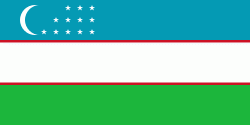Urgench (Urganch)
Urgench (Urganch/Урганч/ئۇرگەنج, ; Ургенч;, Gorgånch/Gorgānč/Gorgânc/Gurganj) is a district-level city in western Uzbekistan. It is the capital of Xorazm Region. The estimated population of Urgench in 2021 was 145,000, an increase from 139,100 in 1999. It lies on the Amu Darya River and the Shavat canal. The city is situated 450 km west of Bukhara across the Kyzylkum Desert. The history of the city goes back to the second half of the 19th century. The city should not be confused with the similarly-named city of Konye-Urgench (also known as "Old Urgench" or "Gurgench") in Turkmenistan. The city of Old Urgench was left after the Amu Darya river changed its course in the 16th century, leaving the old town without water. New Urgench was founded by Russians in the second half of the 19th century at the site of a little trade station of the Khanate of Khiva.
Modern Urgench is a Soviet-style city with cotton motifs adorning many objects, from street lights to apartment houses. Of note is a monument to the twenty Komsomol members killed by Tekke basmachi on the banks of the Syr Darya in 1922, and a large statue to Muhammad al-Khwarizmi, the 9th century local mathematician who revolutionised algebra, outside the Hotel Urgench. Urgench is the main gateway for tourists to Khiva 35 km to the southeast, whose old city, known as Itchan Kala, is a UNESCO World Heritage Site.
The Polish singer Anna German was born in Urgench in 1936.
Modern Urgench is a Soviet-style city with cotton motifs adorning many objects, from street lights to apartment houses. Of note is a monument to the twenty Komsomol members killed by Tekke basmachi on the banks of the Syr Darya in 1922, and a large statue to Muhammad al-Khwarizmi, the 9th century local mathematician who revolutionised algebra, outside the Hotel Urgench. Urgench is the main gateway for tourists to Khiva 35 km to the southeast, whose old city, known as Itchan Kala, is a UNESCO World Heritage Site.
The Polish singer Anna German was born in Urgench in 1936.
Map - Urgench (Urganch)
Map
Country - Uzbekistan
 |
 |
| Flag of Uzbekistan | |
The first recorded settlers in what is now Uzbekistan were Eastern Iranian nomads, known as Scythians, who founded kingdoms in Khwarazm (8th–6th centuries BC), Bactria (8th–6th centuries BC), Sogdia (8th–6th centuries BC), Fergana (3rd century BC – sixth century AD), and Margiana (3rd century BC – sixth century AD). The area was incorporated into the Iranian Achaemenid Empire and, after a period of Macedonian rule, was ruled by the Iranian Parthian Empire and later by the Sasanian Empire, until the Muslim conquest of Persia in the seventh century.
Currency / Language
| ISO | Currency | Symbol | Significant figures |
|---|---|---|---|
| UZS | Uzbekistan som | so'm or Ñўм | 2 |
| ISO | Language |
|---|---|
| RU | Russian language |
| TG | Tajik language |
| UZ | Uzbek language |















